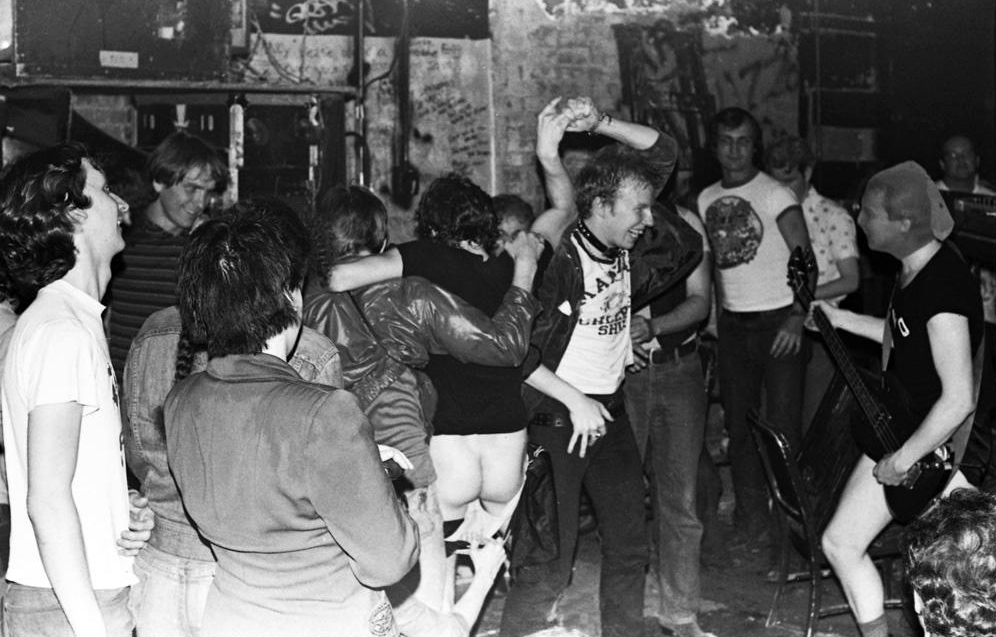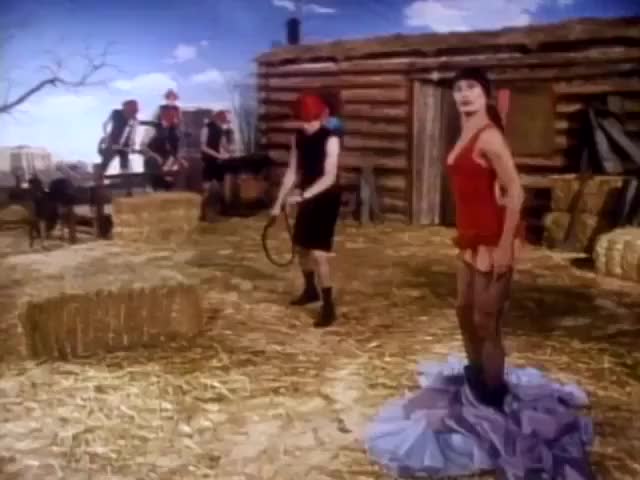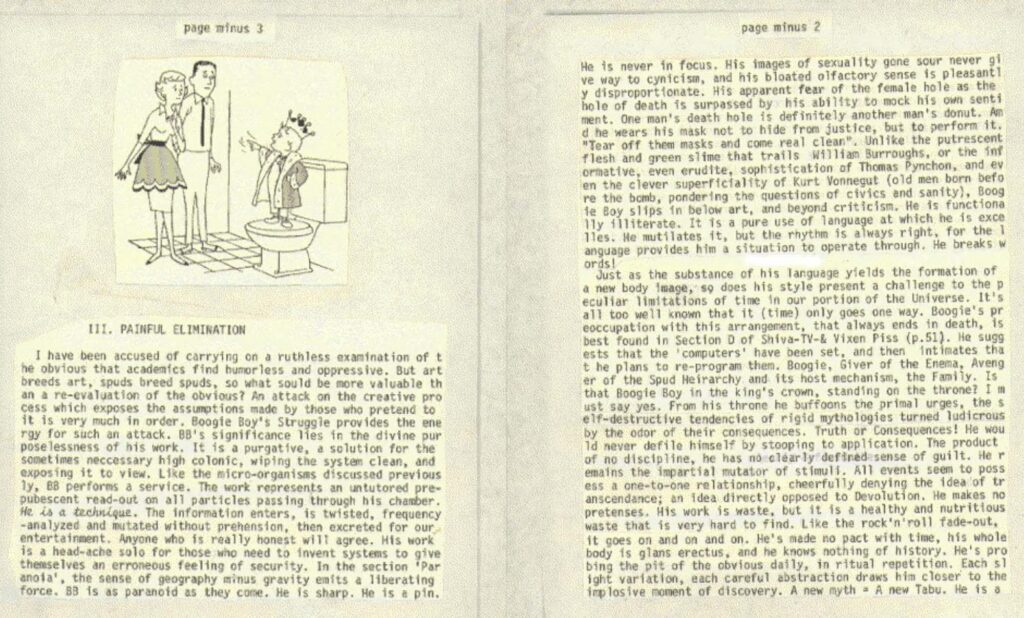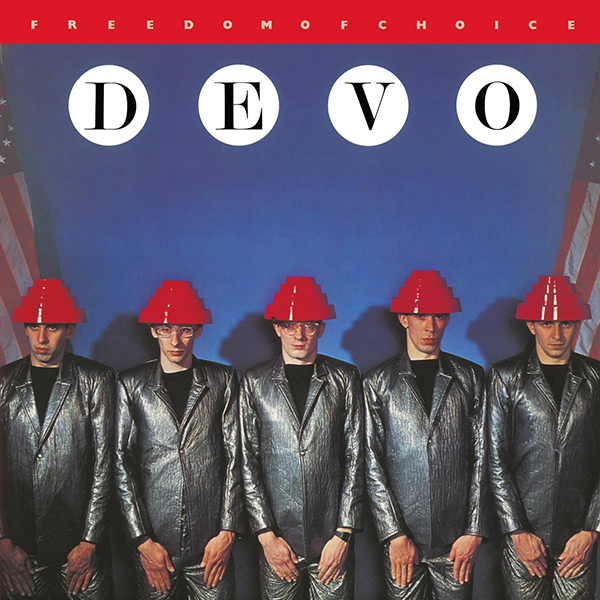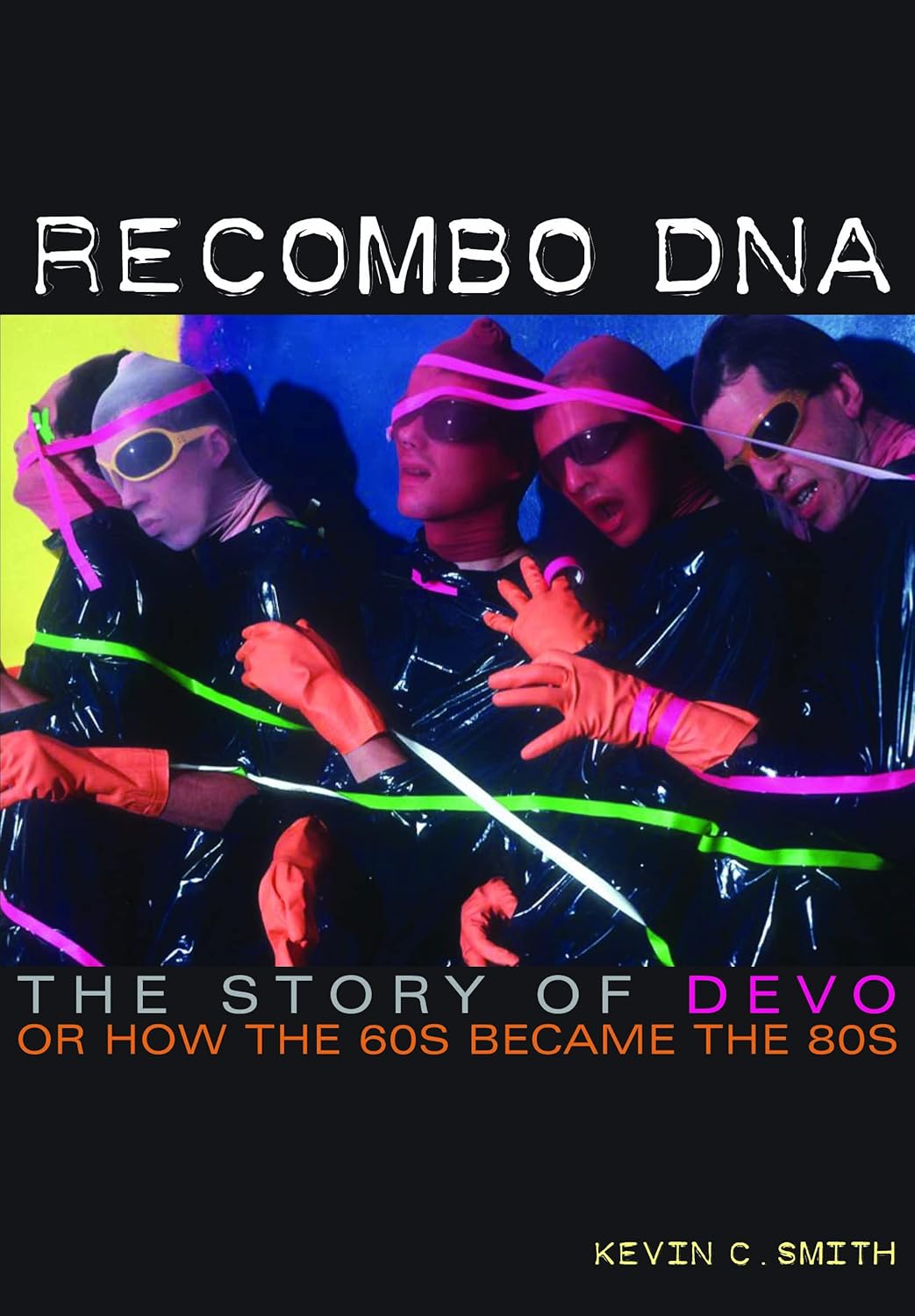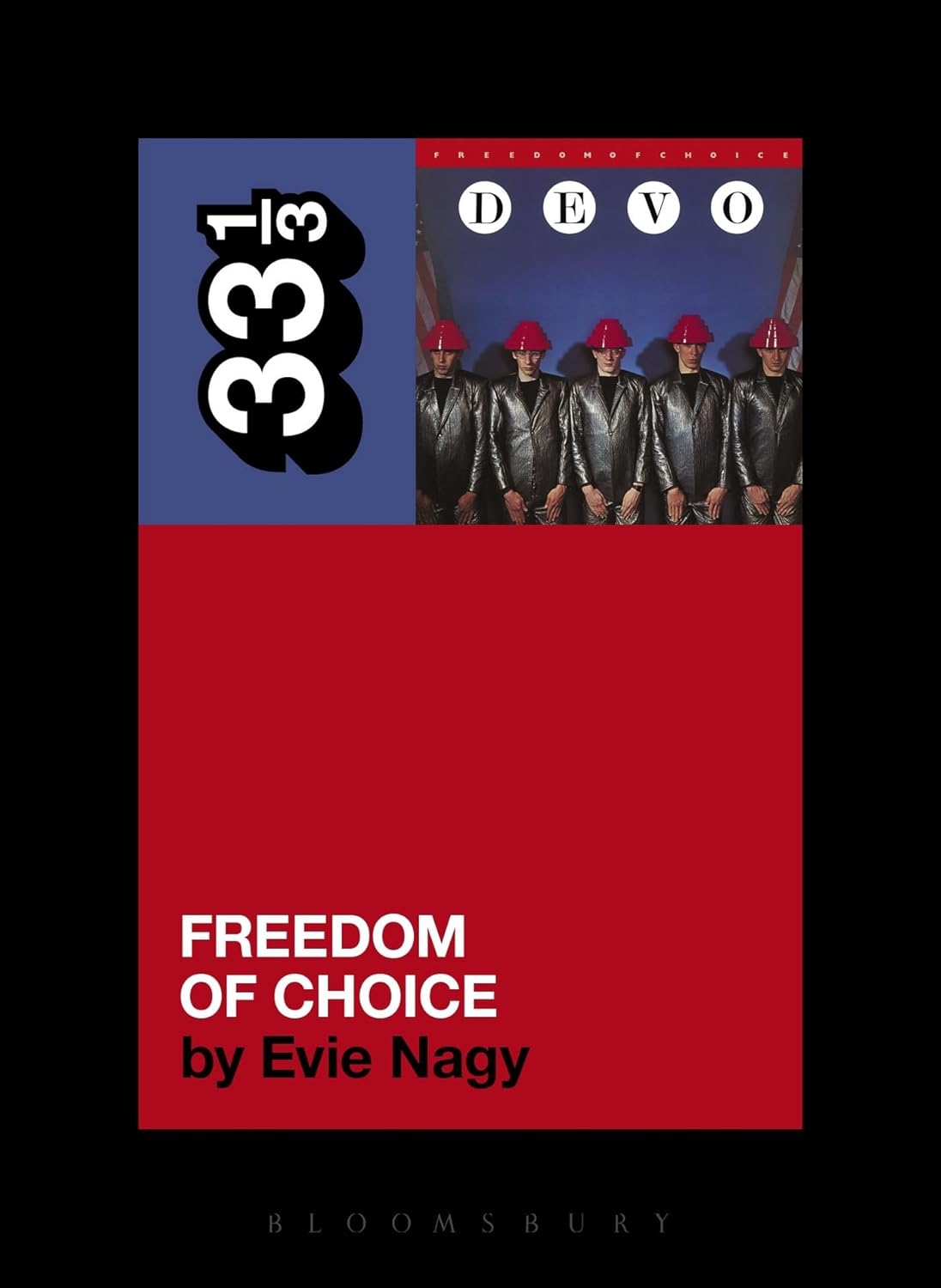Pynchon Music: Devo
pondering the questions of civics and sanity
God made man! / But he used the monkey to do it
—“Jocko Homo,” 1977
Devo (1973–present)
Formed by Kent State University students Mark Mothersbaugh and Jerry Casale, Devo started as a guerrilla art project based around the idea of “devolution,” a kind of regressive evolution by which humanity were degenerating back into apes. Known for their satirical demonstrations, bizarre publications, and even an occasional musical performance or two, Devo eventually coalesced into an art-punk band organized around a Dadaist mythology of its own creation, complete with masked alter-egos, cult-like manifestos, and their own Devolutionary Oath. The fact that much of their aesthetic was derived from comic books and crackpot religious pamphlets was half the fun, but the intent was serious, in part an artistic response to the social derangement of the Kent State shootings.
Inspired by a diverse group of musicians including Morton Subotnick, Soft Machine, Captain Beefheart, and the Residents, early Devo shows were an eclectic blend of prog, punk, and performance art. With an emphasis on electronics, they anticipated New Wave, but Devo has always resisted categorization. In 1976 they hired Chuck Statler to film a surreal musical manifesto, The Truth About Devolution, which won the Ann Arbor Film Festival in 1977. The film caught the attention of David Bowie, who helped Devo secure a recording contract with Warner Brothers. In 1978 they released their major label debut, Q: Are We Not Men? A: We Are Devo! Produced by Brian Eno, the album announced the arrival of, in Bowie’s words, “The band of the future.”
While Devo’s studio albums featured taut production values, their live shows tore up the stage with raw energy, and they began to develop a cult following outside their native Ohio and the New York CBGB crowd. Partly because of their quirky costumes and gleeful shtick, the media labeled Devo a “joke band” and often referred to them as “clowns.” It didn’t help matters that Devo seemed in on the joke, expressing their contempt of capitalism by whole-heartedly embracing a marketing strategy that literally called their followers “spuds.” Their reputation as a novelty act only solidified when their third album, Freedom of Choice, produced the smash single, “Whip It.”
Now recognized as one of the 80’s most iconic pop songs, “Whip It” mocked the American spirit of can-do optimism by setting its hyper-peppy platitudes against an undercurrent of violence and sadomasochism. The band’s biggest hit, the song introduced Devo to millions of new listeners, some of which were surprised to discover the “joke band” had a dark side. Even today, the “Whip It” video manages to disturb, with its reliance on forced artificiality, its exploitative use of a severely cross-eyed actress, and of course, its central conceit—a woman having her clothing whipped from her body as the crowd cheers on. While the fusion of upbeat lyrics and music with provocative imagery was nothing new for Devo fans, the public frequently failed to understand their subversive aesthetic. While some continued to dismiss Devo as unserious, others with a less-nuanced grasp of satire began throwing around labels like “misogynist” and even “fascist.” (Frank Zappa and Laibach faced similar accusations throughout the humor-impaired 1980s.) Indeed, the great comedienne and feminist Lily Tomlin refused to host The Midnight Special unless Devo was cut from the bill!
Although “Whip It” was followed by more hit singles and the brilliant New Traditionalists album, Devo never reclaimed the popular success of Freedom of Choice. With the arrival of Oh No! It’s Devo! in 1982, the band entered a period of creative and commercial decline, exacerbated by friction with their label and a self-confessed over-reliance on technology. After the disastrously bad Smooth Noodle Maps flopped in 1990, Devo called it quits. Mark Mothersbaugh went on to become a successful film composer, while Jerry Casale pursued a career in winemaking.
Fortunately, the break-up was only an extended hiatus, and Devo reformed for the 1996 Lollapalooza festival. Returning to their punk roots, the re-vitalized band surprised audiences with the energy of their shows, acting as if everything past Oh No! It’s Devo! had vanished down the memory hole.
Taking to heart the fifth tenet of the Devolutionary Oath—“We must repeat!”—since 1996, Devo has managed to reunite every few years, usually for brief tours or one-off shows in L.A. or New York. In 2010 they released their ninth studio album, the excellent Something for Everybody. Named after an Elvis Presley LP and featuring artwork that seemed like Devo’s bonkers response to Led Zeppelin’s Presence, it was a welcome return to the creative ingenuity of their early days. In 2014 Bob Casale, known to the band and fans alike as “Bob 2,” died of heart failure. In tribute to their fallen comrade, Devo played a series of sold-out gigs devoted solely to their early music—“Whip It” wasn’t even in the encore.
In more recent times, Devo has been undergoing a critical renaissance. No longer dismissed as a “joke band” or “one hit wonder,” Devo has been the subject of numerous books and think-piece re-evaluations, and their influence has been noted on bands ranging from Primus to Radiohead. Mark Mothersbaugh’s “Myopia” exhibit made the museum circuit, drawing rave reviews for its musical inventions and artistic expressions of devolution. Although they just missed being inducted into the Rock & Roll Hall of Fame—really, Ohio?—it seems David Bowie was more right than he knew.
Pynchon Connection
That was various things I’d been thinking about devolution: going ahead to go back, things falling apart, entropy. It grabbed every piece of information and gave it some kind of cohesive presence—it was a package.
—Jerry Casale, 1978
The first time Devo mentioned Thomas Pynchon was in Jerry Casale’s introduction to My Struggle, a satirical pamphlet/manifesto/art project written by Mark Mothersbaugh under his alter-ego, Boogie Boy. (Later changed to Booji Boy, but still pronounced “Boogie.”) Written in 1978 under his own alter-ego “Chinaman,” the introduction is worth quoting at length, as it touches upon numerous Pynchonian themes, particularly paranoia, entropy, and waste:
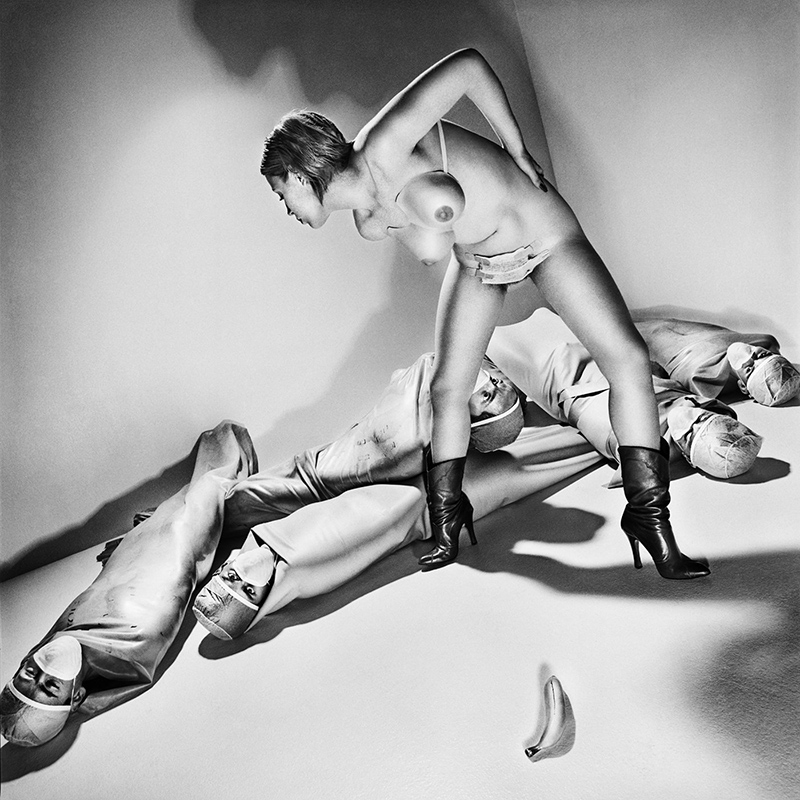 Is that Pirate Prentice’s banana?
Is that Pirate Prentice’s banana?
On several occasions, Casale has claimed that “Whip It” was inspired by the offbeat, hyper-peppy songs in Gravity’s Rainbow. In her book Devo’s “Freedom of Choice,” Evie Nagy writes:
A year later Casale would compose the song “Beautiful World” for the 1981 album New Traditionalists. While he’s never connected the song to Gravity’s Rainbow, it has the same kind of blithely optimistic lyrics as Pynchon’s parodies, a satire made all the more pointed by the music video, which contrasts the peppy lyrics with images of hatred and warfare—never a frown in Rocket, Sock-it Town!
Lyrics
“Whip It”
Give the past a slip
Step on a crack
Break your mama’s back
When a problem comes along—
You must whip it
Before the cream sits out too long—
You must whip it
When something’s going wrong—
You must whip it
Now whip it! Into shape! Shape it up!
Get straight! Go forward! Move ahead!
Try to detect it! It’s not too late—
To whip it
Whip it good!
When a good time turns around—
You must whip it
You will never live it down—
Unless you whip it
No one gets away—
Until they whip it
I say whip it!
Whip it good
I say whip it!
Whip it good
Crack that whip!
Selected Songs from Gravity’s Rainbow
Time to gather your arse up off the floor,
(have a bana-na)
Brush your teeth and go toddling off to war,
Wave your hand to sleepy land,
Kiss those dreams away,
Tell Miss Grable you’re not able,
Not till V-E Day, oh,
Ev’rything’ll be grand in Civvie Street
(have a ban-ana)
Bubbly wine and girls wiv lips so sweet—
But there’s still the German or two to fight,
So show us a smile that’s shiny bright,
And then, as we may have suggested once before—
Gather yer blooming arse up off the floor!
Well good mornin’ gang, let’s start it
Off with a bang, so long to
Double-u Double-u Two-o-o-o!
Now the fightin’s over and we’re all in clover
And I’m here ta bring sunshine to you—
Hey there Herman the German, stop yer fussin’
and squirmin’,
Don’tcha know you’re goin’ home ta stay—
No, there’s never a frown, here in Rocket,
Sock-it Town,
Where ev’ry day’s a beautiful day—
(Quit kvetchin’, Gretchen!)
Go on and have a beautiful daa-aay!
I’ll tell you it’s just —out, —ray, —juss,
Spirit is so —on, —tay, —juss,
Nobody knows their a-ges…
Walkin’ through bees of hon —ney,
Throwin’ away —that —mon, —ney,
Laughin’ at things so —fun —ny,
Spirit’s comin’ through —to, —you!
Nev —ver, —mind, watcha hear from your car,
Take a lookit just —how —keen —they are,
Nev —ver, —mind, —what, your calendar say,
Ev’rybody’s nine months old today! Hey,
Pages are turnin’ pages.
Nobody’s in —their, —ca, —ges,
Spirit’s just so —con, —ta, —gious—
Just let the Spirit —move, —for, —you!
SIDEBAR (beside verses 1 and 2):
Where did the swing band come from? She’s bouncing up and down, she wants to be jitterbugged, he sees she wants to lose her gravity—
How-dy neighbor, how-dy pard!
Ain’t it lonely, say ain’t it hard,
Passin’ by so silent, day-after-day, with-out, even
a smile-or, a friendly word to say? Oh, let me
Tell ya bud-dy, tell ya ace,
Things’re fal-lin’, on their face—
Maybe we should stick together part o’ the way, and
Skies’ll be brighter some day!
Now ev’rybody—
Additional Information
2. It’s Not Right (2:20)
3. Whip It (2:37)
4. Snowball (2:28)
5. Ton o’ Love (2:29)
6. Freedom of Choice (3:26)
7. Gates of Steel (3:26)
8. Cold War (2:30)
9. Don’t You Know (2:14)
10. That’s Pep! (2:17)
11. Mr. B’s Ballroom (2:45)
12. Planet Earth (2:45)
Mark Mothersbaugh—lead and backing vocals, keyboards, guitar.
Gerald Casale—lead and backing vocals, keyboards, bass guitar.
Bob “2” Casale—backing vocals, keyboards, guitar.
Bob Mothersbaugh—backing vocals, guitar.
Alan Myers—drums.
Books
Recombo DNA does more than tell the story of Devo’s formation and rise to fame; it brings to life an entire era, from Ohio’s punk underground to the glitter-trash stages of New York City. You’ll be digging out old Pere Ubu albums and searching desperately to hear the Screamers. Essential reading, not just for Devo fans.
Part of the wonderful 33 1/3 series, Freedom of Choice picks up where Recombo DNA leaves off, and Nagy tells the story of a band imploding with unexpected success.
The “Big Book of Devo,” this collector’s book is for Devo-ted spuds only; chock-fill of images, anecdotes, and rarities. And yes…one of Spermatikos Logos’ editors may have helped with the crowd-funding…
Pynchon on Record
Return to the main music page
Last Modified: 31 August 2024
Main Pynchon Page: Spermatikos Logos
Contact: quail(at)shipwrecklibrary(dot)com
1. Wear gaudy colors or avoid display
2. Lay a million eggs or give birth to one
3. The fittest shall survive yet the unfit may live
4. Be like your ancestors or be different
5. We must repeat!



